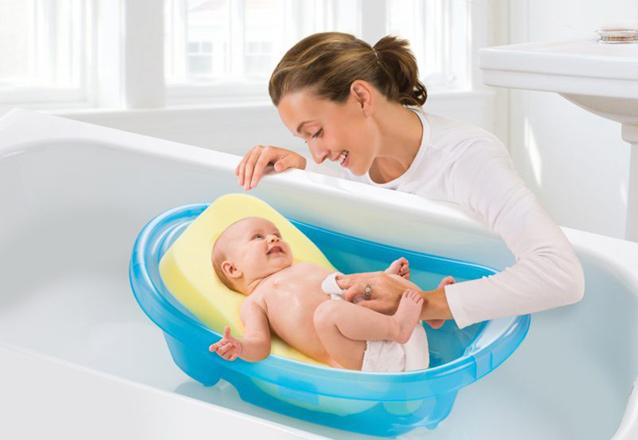You are here
Delayed newborn baths tied to higher breastfeeding rates
By Reuters - Feb 19,2019 - Last updated at Feb 19,2019

Photo courtesy of summerinfant.co.uk
Newborns who don’t get baths right away may be more likely to be exclusively breastfed than infants who get whisked away to be washed soon after delivery, a US study suggests.
Paediatricians recommend that mothers exclusively breastfeed infants until at least 6 months of age because it can reduce babies’ risk of ear and respiratory infections, sudden infant death syndrome, allergies, childhood obesity and diabetes. While breast milk itself is linked to many of these health benefits, so is the skin-to-skin contact that happens when babies nurse.
But many new mothers still don’t breastfeed exclusively in the hospital or stop doing so when they go home, researchers note in the Journal of Obstetric, Gynaecologic & Neonatal Nursing.
While some women stop nursing because it’s too painful or difficult, or because work schedules make it impossible, some previous research suggests that breastfeeding can get off to a better start when mothers are not separated from babies in the hospital and get more opportunities in those first few days for bonding and skin-to-skin contact.
In the current study, researchers examined exclusive breastfeeding rates at one hospital that changed its newborn bathing policy from washing infants within two hours of delivery to delaying baths until 12 to 24 hours after birth. The study included 448 mothers and babies with deliveries under the old bathing policy and 548 mother-infant pairs who were covered by the new delayed bathing policy.
The proportion of mothers who exclusively breastfed while in the hospital rose from about 60 per cent with rapid bathing to 68 per cent with the new delayed bathing policy.
“Our previous practice encouraged early separation of mother and baby,” said lead study author Heather DiCioccio, a nursing professional development specialist at Cleveland Clinic Hillcrest Hospital in Mayfield, Ohio.
“We would bathe the baby on the warmer in labour and delivery or if the labour and delivery nurse was getting the mother up to the bathroom for the first time, we would take the baby to the nursery for the bath,” DiCioccio said by e-mail. “By delaying the bath, this separation does not happen.”
During their hospital stay, mothers were 49 per cent more likely to exclusively breastfeed babies after the new policy, the study found.
Women were also more likely to report they planned to continue breastfeeding at least some of the time when they were discharged from the hospital.
The study wasn’t a controlled experiment designed to prove whether or how the timing of newborn baths might directly affect breastfeeding. Researchers also lacked data on how many women breastfed babies after they went home from the hospital, and how many did so exclusively.
But the study adds to the evidence that postponing that first bath may benefit babies, said Jennifer Yourkavitch, a lactation consultant at the Centre for Women’s Health and Wellness at The University of North Carolina, Greensboro, who wasn’t involved in the study.
“Bathing an infant immediately after birth can instigate a negative chain of events for the breastfeeding experience,” Yourkavitch said by e-mail.
A bath right after birth can make babies cold and require them to burn fat to stay warm, which in turn can cause stress and low blood sugar. When blood sugar gets too low, babies are more likely to receive formula, and formula supplementation can then make it harder to get infants to latch on the breast and nurse,” Yourkavitch added.
Related Articles
AMMAN — The exclusive breastfeeding rate in Jordan is well below the regional average, according to a statement by the Higher Population Cou
AMMAN — The Jordan University Hospital (JUH) on Wednesday launched the Baby Friendly Hospital Initiative (BFHI), which aims at improving neo
Many breastfed infants may not get enough vitamin D because their mothers prefer not to give babies supplement drops, a study suggests.


















